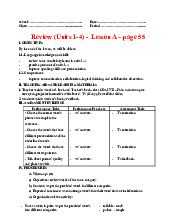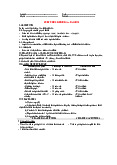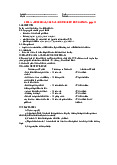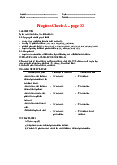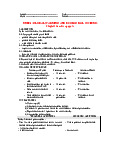





Preview text:
School: ………………………………………..
Date:……………………………………..
Class: …………………………….....................
Period: ……………………………......... UNIT: HELLO!
Lesson 1 – Review Vocabulary & Grammar (Pages 6 & 7) I. OBJECTIVES
By the end of the lesson, Ss will be able to:
1.1. Language knowledge and skills
- review vocabulary related to daily routines, household chores and free-time activities
- review conditional Type 1 and Type 2 1.2. Competences
- improve communication, collaboration, logical thinking, and collaborative discussion. 1.3. Attributes
- be responsible, patriotic, and hard-working.
- respect and love their family more.
II. TEACHING AIDS AND LEARNING MATERIALS
1. Teacher’s aids: Student’s book and Teacher’s book, class CDs, IWB – Phần mềm tương tác trực
quan, projector/interactive whiteboard / TV (if any), PowerPoint slides.
2. Ss’ aids: Student’s book, workbook.
III. ASSESSMENT EVIDENCE Performance Tasks Performance Products Assessment Tools
- Complete the phrases with the - Ss’ answers/ presentation. - T’s observation.
verbs in the list. Then listen and check.
- What is your daily routine like? - Ss’ answers/ presentation. - T’s feedback
What chores do you do at home? Tell your partner.
- Label the pictures with the free-time - Ss’ answers/ presentation. - T’s feedback/Peers’
activities in the list. Then listen feedback. and check.
- Find out about your partner’s - Ss’ answers/ presentation. - T’s feedback/Peers’
favourite free-time activities. feedback.
- Make sentences using the first - Ss’ answers/ presentation. - T’s feedback/Peers’ conditional (type 1). feedback.
- Put the verbs in brackets into the - Ss’ answers/ presentation. - T’s feedback/Peers’ correct forms of the second feedback.
conditional (type 2). Add a comma where necessary. IV. PROCEDURES A. Warm-up: (5’)
a) Objectives: First, Ss activate their prior knowledge by brainstorming ideas and thoughts
about the vocabulary related to daily routines/household chores.
b) Content: Ss guess and match the photos to their appropriate meanings.
c) Expected outcomes: Ss can be engaged and recall some vocabulary related to the topic.
d) Organisation of the activity: TEACHER’S ACTIVITIES SS’ ACTIVITIES Daily Routines Mime
- Divide the class into small groups. - Work in groups.
- Prepare pictures of household chores (or ones from 12
pictures in Task 1 – page 6 – SB)
- Explain that each group selects a student to mime an
activity related to daily routines or household chores
without saying any words, and then the other groups will guess the activity.
- Have one S from one group take one picture and act - Act out the activity.
out the activity on the picture using gestures, facial
expressions, and body movements, while the other
groups guess the activity within a time limit (e.g., one
Suggested pictures for mimes: minute).
Brushing teeth, making the bed, washing
- Tell Ss that the group that correctly guesses the activity dishes, sweeping the floor, taking a shower,
earns a point. The group with the most points at the end setting the table, cooking dinner, ironing wins.
clothes, watering plants, taking out the - Give feedback. rubbish, etc. - Leads to the lesson. B. New lesson (35’)
Activity 1: Presentation & Practice (Vocabulary) (8’)
a) Objectives: Ss revise/practise vocabulary for daily routines/household chores. b) Content: Task 1
c) Expected outcomes: Ss will be able to identify, define and use key vocabulary related to daily routines and household chores.
d) Organisation of the activity: TEACHER’S ACTIVITIES SS’ ACTIVITIES
Task 1. Complete the phrases with the verbs in the list. Then listen and check.
- Direct Ss’ attention to the pictures and ask them to - Listen to the teacher. look at the words in the list.
- Complete the phrases with the verbs given.
- Give Ss time to complete the phrases.
- Have Ss work individually to complete the task.
- Play audio (CD 1 Track 2) and have Ss listen and - Listen and repeat. repeat.
- Play the recording with pauses for Ss to listen and - Check their answers. check their answers. Answer keys
- Check answers as a whole class. 1 load 2 take 3 answer 4 mop
- Present the new vocabulary words to the class. 5 make 6 play 7 do 8 watch (using IWB/ PPTs). - Correct Ss’ pronunciation. 9 vacuum 10 catch 11 dust 12 set - Give feedback.
Task 2. What is your daily routine like? What
chores do you do at home? Tell your partner.
- Divide the class into pairs. - Work in pairs.
- Have each pair take turns discussing their daily
- Discuss their daily routines and the chores
routines and the chores they do at home. they do at home.
- Encourage Ss to use the vocabulary and phrases
Suggested Answer Key
related to daily routines and household chores that
1. I usually get up early in the morning and I make they have learned.
breakfast. Then, I get ready for school. I usually catch
- Provide a list of guiding questions to help them
the bus to school. I come back from school at about structure their conversation:
3:30 in the afternoon. Then I help my parents do
chores around the house. In the evening, I usually have
What time do you usually get up in the morning?
dinner with my family at around 7:30 and sometimes
How do you usually go to school?
watch the news with my dad after dinner. After that, I
How do you spend your time after school?
do my homework and prepare for the next day’s
What chores do you help your parents with around the house?
lessons, then listen to some music before I go to bed at
How often do you mop the floor? about 11 o’clock.
- Allow the pairs some time to have their conversation, 2. I usually set the table before meals and mop the
encouraging them to ask follow-up questions.
floor to help my mom. I also do the laundry at
- Give feedback on any language or pronunciation
weekends. Sometimes I dust the furniture with my
issues that arise during the discussion. sister.
Activity 2: Presentation & Practice (Vocabulary) (8’)
a) Objectives: Ss revise/practise vocabulary for free-time activities. b) Content: Task 2
c) Expected outcomes: Ss will be able to identify, define and use key vocabulary related to free- time activities.
d) Organisation of the activity: TEACHER’S ACTIVITIES SS’ ACTIVITIES
Task 3. Label the pictures with the free-time
activities in the list. Then listen and check.
- Direct Ss’ attention to the pictures and ask them to
- Listen to the teacher’s instructions.
look at the activities in the list.
- Give Ss time to label the pictures. - Label the pictures.
- Play the recording (CD 1 Track 3) with pauses for Ss - Complete the task individually.
to listen and check their answers.
- Have Ss practise saying phrases in pairs.
- Listen and repeat chorally and/or
- Circulate and offer help if necessary. individually.
- Pay attention to Ss’ pronunciation and make
- Practise saying the words in pairs. corrections as necessary. Answer Key - Give feedback.
1 read books 2 go to the mall
3 play football 4 go to museums
5 go on a picnic 6 attend a sporting event
7 play video games 8 build robots
Task 4. Find out about your partner’s favourite free-time activities.
- Explain the task and read out the example.
-Have Ss complete the task in pairs and then ask some
- Talk about others’ favourite free-time
Ss to share their answers with the class.
activities and share them with the class.
Provide a list of questions to encourage conversations.
What is your favourite free-time activity?
How often do you engage in this activity?
Why do you enjoy it?
Suggested Answer Key
How did you get interested in this activity?
A: What do you do in your free time?
Do you like to do it alone or with others?
Are there any challenges or difficulties you face while doing
B: I usually read books and sometimes play
video games. What about you? this activity?
Would you like to learn any new free-time activities in the
A: I often build robots. future?
- Once both partners have completed their
conversations, bring the class back together.
- Select some pairs to share interesting information
they learned about their partners' favourite free-time activities. - Provide feedback. *ALTERNATIVE ACTIVITY:
- Divide the class into pairs or small groups. - Work in pairs/small groups.
- Provide each group with a survey worksheet: Name of Student
Favourite Free-time Activity …. Read books Go to the mall Play football Go to museums Go on a picnic Attend a sporting event
- Have each group take turns surveying each other by asking the following question:
"What is your favourite free-time activity from the list?"
- Encourage Ss to ask follow-up questions such as
"Why do you enjoy that activity?" or "How often do you engage - Ask follow-up questions. in it?"
Once the survey is complete, have each group summarise their findings.
- Ask some groups to share their survey results with - Share the results.
the class, highlighting the most popular free-time activities. - Give feedback.
Activity 3: Practice – Grammar (13’)
a) Objectives: Ss revise and practise the first conditional. b) Content: Task 5
c) Expected outcomes: Ss will be able to describe how a high-tech house robot supports them in their
daily routines and household chores, using the first conditional.
d) Organisation of the activity: TEACHER’S ACTIVITIES SS’ ACTIVITIES
Task 5. Make sentences using the first conditional (type 1)
- Review the first conditional structure, emphasising
its use for talking about possibilities and likely outcomes in the future.
- Write the structure on the board: "If + subject +
present simple, subject + will + base verb." - Provide examples:
If I finish my homework early, I will play video games.
If she cleans her room, her parents will take Answer Key her to the mall.
2 If you don’t interact with it, it will go to sleep.
- Explain the task and read out the examples.
3 If you programme it, it will wake you up for school.
- Ask Ss to refer to the Grammar Reference
4 If you ask it a question, it will answer.
5 If you tell it to play music, it will do.
section to revise any points they are unsure of.
- Give Ss time to complete the task. - Check Ss’ answers.
Task 6. Put the verbs in brackets into correct
forms of the second conditional (type 2). Add a comma where necessary.
- Review the second conditional (Type 2) to the Ss, - Review the structure.
explaining its structure and usage.
Form: If + past simple, would + base verb
- Explain that the second conditional is used to talk
about imaginary or unlikely situations in the present. - Provide examples:
If they had a dishwasher, they wouldn't have to wash dishes by hand.
If she had more time, she would practice playing the piano every day. Answer Key
If it weren't rainy, we would go for a walk in 2 If it weren’t rainy Minh ,
would play football. the park.
3 I would go on a picnic instead of going to
- Explain the task and read out the examples.
the mall if I were/was you.
4 If Ann didn’t have a headache she would ,
- Ask Ss to refer to the Grammar Reference help me make breakfast.
section to revise any points they are unsure of.
5 If Nancy were at home now she , would
- Complete the sentence using the correct form of vacuum the rug.
the verb in brackets for the second conditional (Type 6 Dave would help you dust the furniture if he were 2).
not/weren’t/was not/wasn’t busy.
7 If I knew his address and phone number,
- Write the missing verb form in the blank space I would tell you. provided.
8 What would you do if you had more
- Pay attention to the verb tense and structure. Refer free time now?
to the example given to understand the pattern.
- Give Ss time to complete the task. - Check Ss’ answers. - Give feedback.
Activity 4: Production (6’)
a) Objectives: Ss can make a connection to the grammar structures and vocabulary of daily routines,
household chores and free-time activities. b) Content: Task 4
c) Expected outcomes: Ss can talk about daily routines, household chores, or free-time activities, using
the conditionals - types 1 and 2.
d) Organisation of the activity: TEACHER’S ACTIVITIES SS’ ACTIVITIES Activity: "What If...?"
- Divide the Ss into pairs or small groups.
- Discuss in pairs/small groups.
Explain to the Ss that they will be creating
conditions by using the first and second conditionals.
- Provide each group with a set of situation cards,
each containing a different scenario related to the
given vocabulary (daily routines, household chores, free time activities).
Example Situation Cards:
Suggested Answer:
1. Situation: It's a sunny day. You have free time in the 1.
Condition: If it weren't sunny, I would go for afternoon.
a hike in the mountains.
Condition: If it weren't sunny, ____. 2.
Condition: If Nancy were at home, she
2. Situation: Nancy is not at home. The rug needs to be would vacuum the rug. vacuumed. 3.
Condition: If the weather is sunny and
Condition: If Nancy were at home, ______.
warm, we will go to the beach. Condition: If
3. Situation: You are planning a weekend trip with your
the weather is rainy or cold, we will visit a
friends. You have two options: going to the beach or historical site.
visiting a historical site. 4.
Condition: If the concert tickets are too
Condition: If the weather is sunny and warm, we
expensive, we will watch a movie instead. __________.
Condition: If the movie theatre offers
Condition: If the weather is rainy or cold, we will visit a
discounted tickets, we will go to the music historical site. concert.
4. Situation: You are discussing weekend plans with your
friend, Sarah. You have two options: going to a music
concert or watching a movie.
Condition: If the concert tickets are too expensive, we will __________.
Condition: If the movie theatre offers discounted tickets, we will __________.
- Encourage them to use the target vocabulary and
structures related to the first or second conditional. - Give feedback.
C. Consolidation and homework assignments (5’) * Consolidation
- Review key vocabulary words from the lesson (daily routines, household chores, free time activities)
with the correct pronunciation. * Homework:
- Review vocabulary of the topics: daily routines, household chores, free time activities.
- Practise the first and second conditionals.
- Do the exercises in WB (page 4).
- Prepare: Unit Hello, Lesson 2 – Review Grammar & Vocabulary - Pages 7 & 8 V. REFLECTION
a. What I liked most about this lesson today:
………….………………………………………………………………………………
b. What I learned from this lesson today:
…………………………………………………………………………………………
c. What I should improve for this lesson next time:
…………………………………………………………………………………………
